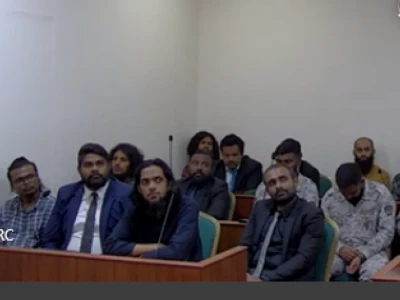
No method for intelligence coordination, NCTC says
Nazim said counter-terrorism officials had told him at the closed meeting that there was still no way to coordinate intelligence among the uniformed agencies.
Top Stories
By
Mohamed Muzayyin Nazim
The National Counter Terrorism Centre (NCTC) has told a parliamentary committee that there is still no way to coordinate intelligence among security agencies.
The NCTC concern over the matter was expressed at a closed meeting of the Security Services (241) Committee held on Tuesday last week, and was revealed by the Deputy Speaker of the Parliament, Dhiggaru MP Ahmed Nazim, at a meeting of the committee held in the open on Monday.
Nazim asked the committee chairman, Eydhafushi MP Ahmed Saleem, what was the update on the decision taken regarding Tuesday's closed meeting.
Nazim said counter-terrorism officials had told him at the meeting that there was still no way to coordinate intelligence among the uniformed agencies.
"The secretariat of this committee showed us the classified report on the attack on President Nasheed that day. Then it says that the biggest problem was the lack of coordination [of intelligence between agencies]," Nazim said.
"So that day we said here, shouldn't we bring that [intelligence hindrance] issue to the attention of the officials of this government now. Shouldn't we write again since we have been informed?”
Replying to Nazim's question, Saleem said the committee's administrative desk has now prepared a letter to bring the matter to the attention of the government. The letter will be sent sometime on Monday, he said. Saleem did not give further details of the letter.
One of the purposes of the NCTC's meeting on Tuesday was to examine the implementation of the recommendations of the 241 Committee of Parliamentary Inquiry into the assassination attempt on Nasheed and to discuss a confidential report sent by the agency.
The committee interviewed senior security officials and many others in the bombing inquiry and made several recommendations in three areas in its report. Among them, there is a strong emphasis on strengthening the exchange of intelligence information between relevant agencies. Some of the recommendations included are:
-
Further strengthen the exchange of information in the field of terrorism-related intelligence and establish and implement the framework set out in the Prevention of Terrorism Act as soon as possible
-
Develop a harmonised data system to share intelligence information on national security threats within the army, police and relevant agencies
-
Enact a law on national intelligence to eliminate conflicts of interest among intelligence agencies




